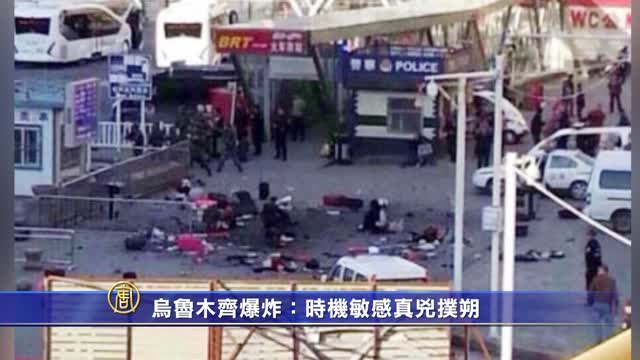An explosion at Urumqi train station on Wednesday in the far western region of Xinjiang in China killed three people and left another 79 injured, highlighting the grim challenges of security and simmering ethnic tensions in the resource-rich province the size of Iran.
Passengers usually fill train stations this time of the year as a three-day national holiday kicks off on May 1.
State-run media Xinhua News Agency labeled the explosion a terrorist plot and said mobs stabbed civilians with knives and denoted the explosives.
The blast came on the heels of Chinese President Xi Jinping’s visit to the region where he vowed “decisive action” against “terrorists”, underscoring efforts by the leadership to prevent isolated attacks from snowballing into a wider crusade to separate Xinjiang, mainly home to the minority Uighurs, who speak a different language.
Urumqi, the capital city of Xinjiang, was the scene of violent ethnic clashes in 2009 that claimed the lives of nearly 200. The majority ethnic Han have been flocking to the region and now accounts for nearly half of the population. Beijing says it has brought prosperity to Xinjiang and treated all ethnicities as equals, but Uighur rights groups fault authorities for stifling religious freedom and imposing discrimination.
In response to the train station blast, President Xi said, “We have to realize that the fight against terrorism is long-term, complicated and acute. The fight against terrorism allows no slackness, and decisive measures should be taken to resolutely suppress terrorists’ aggression”.
Train services in Urumqi were suspended for about two hours before they were reopened.
Censors have moved quickly to scrub photos of the blast on Sina Weibo, China’s most popular microblogging service, with some state media only posting photos of police standing guard at the scene.
Below are some less politically sensitive discussions remained in Sina Weibo. Luda Cici wrote:
对少数民族国家其实做的还不错,我也觉得少数民族没什么,恐怖分子之所以活跃在少数民族聚集地就是为了让我们觉得有少数民族的地方就是恐怖主义然后要求少数民族分离出去。
China has treated ethnic minorities relatively well, and I think it’s not the ethnic minorities who are wrong, the reason why terrorists are active in places where ethnic groups live is because they want to let us feel that wherever there are ethnic groups there is terrorism, and by doing so, they hope to separate the ethnic regions.
Xiaoshidai Dafangke, who lives in Xinjiang, urged:
我在新疆,而且现在在基层,普通维族群众都是朴素善良的,只是那些受宗教极端思想和民族分裂主义势力影响的一小撮人干的,希望每个人正确看待问题,不要把对一小撮的愤怒放大到整个民族身上
I am in Xinjiang and now I live in a small community, Uighur folks are very kind and have good heart, [the attack] was carried out by some religious extremists and those who are affected by separatism. I hope everyone can see the problem in the right way and do not overgeneralize it by blaming the whole ethnic group.
On Twitter, Jan Henryk Dabrowski commented on the ethnic policy:
正如前苏联推行的错误民族政策所造成的恶果正在乌克兰显现一样,中共推行的错误民族政策现在和将来也将招致恶果.新疆的汉人和维吾尔人矛盾总有一天会以战争的形式爆发.
— 拓跋Taugast d'Hôtan (@novaniemi) April 26, 2014
Like the wrong ethnic policies of the Soviet Union, which caused the Ukraine crisis, the wrong ethnic policies that the Communist Party of China has maintained will also cause bad results. One day, there will be a war between the Han and Uighurs.








1 comment